Table of Contents
Introduction To Foods that Boost Gut Health and Mental Well-being
Are you looking for ways to improve your gut health and enhance your mental well-being? Look no further! In this blog post, we will explore the Foods that Boost Gut Health and Mental Well-being . Discover the power of foods that boost gut health and promote mental well-being, and start your journey towards a healthier and happier you. Follow along as we uncover the secrets to a nourished gut and a thriving mind. Let’s dive into the world of foods that can transform your well-being from the inside out.
What is Gut Health and Why is it Important?
Gut health refers to the well-being of our digestive system, specifically the balance and functionality of the bacteria and microorganisms residing in our gastrointestinal tract. This intricate ecosystem plays a vital role in our overall health and well-being.
The gut, often referred to as the “second brain,” is connected to various bodily functions, including digestion, nutrient absorption, immune system regulation, and even mental health. A healthy gut ensures that our body can effectively break down food, absorb essential nutrients, eliminate waste, and maintain a strong immune system.
When our gut is in good health, it promotes optimal digestion and nutrient absorption, leading to increased energy levels and improved overall physical well-being. Additionally, a healthy gut contributes to a robust immune system, reducing the risk of infections and diseases.
Furthermore, research suggests a strong connection between gut health and mental well-being. The gut and the brain communicate through the gut-brain axis, a bidirectional communication system. This means that the health of our gut can influence our mental state and vice versa.
The gut houses trillions of bacteria, known as gut microbiota, which play a crucial role in this gut-brain communication. These bacteria produce neurotransmitters, such as serotonin and dopamine, which are essential for regulating mood and emotions. Thus, an imbalance in the gut microbiota can contribute to mental health issues like anxiety and depression.
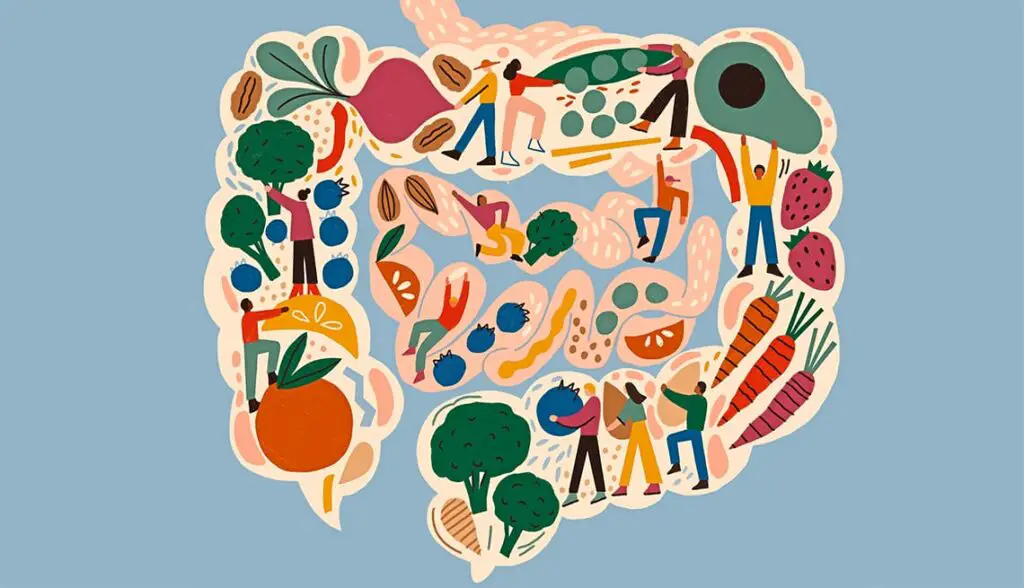
Now, let’s explore the key reasons why gut health is important:
- Digestive Health: A healthy gut ensures proper digestion, absorption, and elimination of food. It helps prevent digestive issues like bloating, constipation, diarrhea, and irritable bowel syndrome (IBS), promoting a comfortable digestive experience.
- Nutrient Absorption: The gut is responsible for breaking down food and absorbing essential nutrients, including vitamins, minerals, and amino acids. Optimal gut health ensures efficient nutrient absorption, supporting overall physical health and vitality.
- Immune System Support: About 70-80% of the immune system resides in the gut. A healthy gut microbiota helps regulate the immune system, protecting against infections, allergies, and autoimmune diseases.
- Mental Well-being: As mentioned earlier, the gut-brain axis influences mental health. A healthy gut promotes the production of neurotransmitters that regulate mood, reducing the risk of mental health disorders such as anxiety and depression.
- Inflammation Control: An imbalanced gut can lead to chronic inflammation, which is associated with various health conditions, including inflammatory bowel disease (IBD), obesity, and cardiovascular diseases. Maintaining gut health helps keep inflammation in check.
The Gut-Brain Connection: How Your Gut Affects Your Mental Well-being
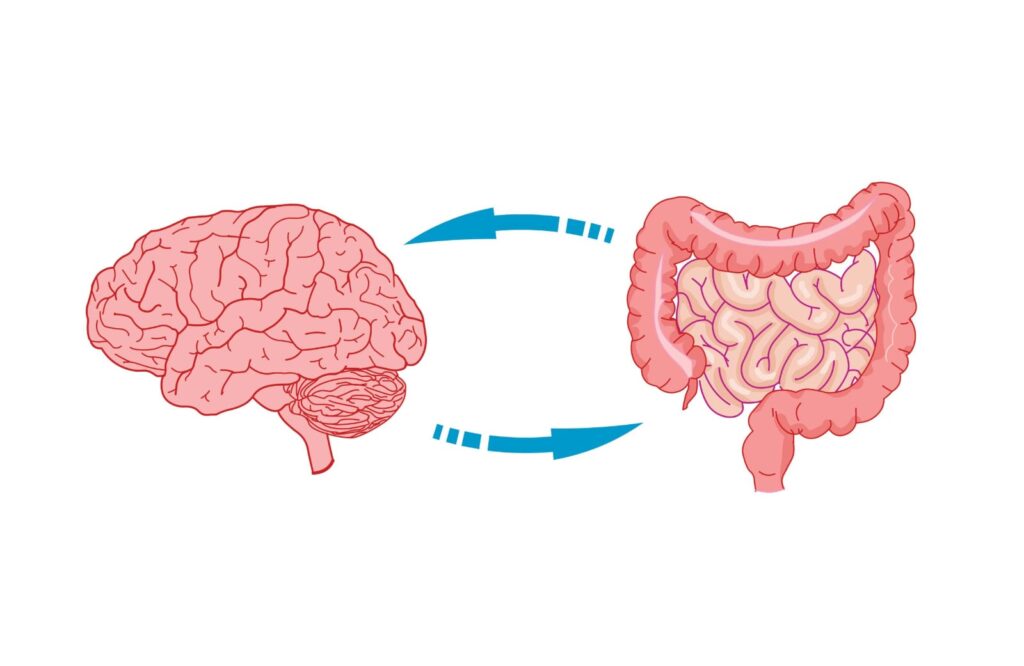
The gut and the brain are intricately linked through a communication highway called the gut-brain axis. This bidirectional pathway allows constant communication and interaction between the gut and the brain. This means that the health of your gut can influence your mental state, and vice versa.
So, how exactly does your gut affect your mental well-being? Let’s delve into the details:
- Neurotransmitter Production: Your gut is a hub for neurotransmitter production. Neurotransmitters are chemical messengers that facilitate communication between brain cells. Surprisingly, about 90% of serotonin, a neurotransmitter associated with mood regulation and happiness, is produced in the gut. This means that a healthy gut can promote a balanced production of serotonin, positively impacting your mental well-being.
- Microbiota Influence: The gut is home to a diverse community of microorganisms, collectively known as the gut microbiota. These microorganisms, including bacteria, fungi, and viruses, have a profound influence on your gut and brain health. The composition and diversity of your gut microbiota can impact neurotransmitter production, inflammation levels, and immune system function, all of which play a role in mental well-being.
- Inflammation and Immune System: Chronic inflammation in the gut can have far-reaching effects on your mental health. An imbalanced gut microbiota can lead to increased inflammation, triggering a cascade of immune responses that can affect the brain. Inflammation in the gut can activate inflammatory pathways in the brain, potentially contributing to mood disorders like anxiety and depression.
- Stress Response: The gut-brain axis also plays a significant role in the body’s response to stress. Stress can disrupt the balance of gut microbiota, leading to changes in gut permeability and inflammation. These changes can, in turn, affect the brain and contribute to the development or exacerbation of mental health conditions.
Understanding the Microbiome: Your Gut’s Ecosystem
The human gut is a fascinating and intricate ecosystem that houses trillions of microorganisms, forming what is known as the gut microbiome. This complex community of bacteria, fungi, viruses, and other microbes plays a crucial role in our overall health, particularly in relation to gut health and mental well-being. In this article, we will delve into the world of the microbiome and explore the foods that can boost gut health and promote mental well-being.
The gut microbiome is unique to each individual and is influenced by various factors such as genetics, early life experiences, diet, and the environment. It functions as a symbiotic partner, supporting our bodily functions and contributing to our overall well-being. Let’s delve deeper into the importance of the gut microbiome and discover the foods that can enhance its health and improve our mental well-being.
- Importance of Gut Microbiota Diversity: The gut microbiota refers to the collection of microorganisms residing in our gut. Maintaining a diverse and balanced microbiota is crucial for gut health and overall wellness. These microorganisms help break down dietary fibers, produce essential vitamins, and regulate our immune system.
- Gut-Brain Connection: The gut and the brain are interconnected through a communication pathway called the gut-brain axis. The gut microbiome plays a significant role in this communication, influencing brain function, mood, and behavior. A healthy gut microbiome can positively impact our mental well-being.
- Foods that Boost Gut Health: Incorporating certain foods into our diet can promote a healthy gut microbiome. These foods are rich in fiber, prebiotics, and probiotics.
The Role of Probiotics and Prebiotics in Gut Health
Probiotics and prebiotics are two key players in maintaining a healthy gut. While they sound similar, they have distinct roles in supporting gut health and overall well-being. In this article, we will explore the importance of probiotics and prebiotics, their benefits, and the foods that contain them.
Probiotics are live bacteria and yeasts that provide numerous health benefits when consumed. They are often referred to as “friendly” or “good” bacteria because they help maintain the balance of microorganisms in our gut. Probiotics can be found in certain foods as well as in dietary supplements.
The benefits of probiotics are plentiful. They can support digestion by breaking down food and absorbing nutrients more efficiently. Probiotics also help maintain a healthy gut by preventing the growth of harmful bacteria, reducing inflammation, and supporting the immune system.
Some common strains of probiotics include Lactobacillus and Bifidobacterium. These can be found in foods such as yogurt, kefir, sauerkraut, kimchi, and other fermented foods. Including these probiotic-rich foods in your diet can help promote a healthy gut and enhance overall well-being.
On the other hand, prebiotics are a type of dietary fiber that act as food for probiotics. They are not digested or absorbed by the body, but instead, they pass through the digestive system and reach the colon intact. Once in the colon, prebiotics serve as nourishment for the beneficial bacteria in our gut.
Including prebiotics in our diet is essential for maintaining a healthy gut microbiome. By providing fuel for probiotics, prebiotics help them thrive and multiply. This leads to a more diverse and balanced gut microbiome, which is associated with improved digestion, enhanced immune function, and reduced risk of certain diseases.
Foods rich in prebiotics include garlic, onions, leeks, asparagus, bananas, and whole grains. Incorporating these foods into your meals can help support the growth of beneficial bacteria in your gut and contribute to overall gut health.
It’s worth noting that probiotics and prebiotics work synergistically to support gut health. While probiotics introduce beneficial bacteria into the gut, prebiotics provide the nourishment these bacteria need to flourish. Together, they form a powerful duo in maintaining a healthy gut ecosystem.
In addition to their individual benefits, probiotics and prebiotics have been associated with various health advantages. These include improved digestion and nutrient absorption, reduced symptoms of digestive disorders such as irritable bowel syndrome (IBS), enhanced immune function, and even potential mental health benefits.
When incorporating probiotics and prebiotics into your diet, it’s important to choose a variety of foods to ensure you’re getting a diverse range of beneficial bacteria and fiber. If you’re considering taking probiotic supplements, it’s advisable to consult with a healthcare professional or registered dietitian to determine the most suitable strains and dosage for your specific needs.
Foods Rich in Probiotics
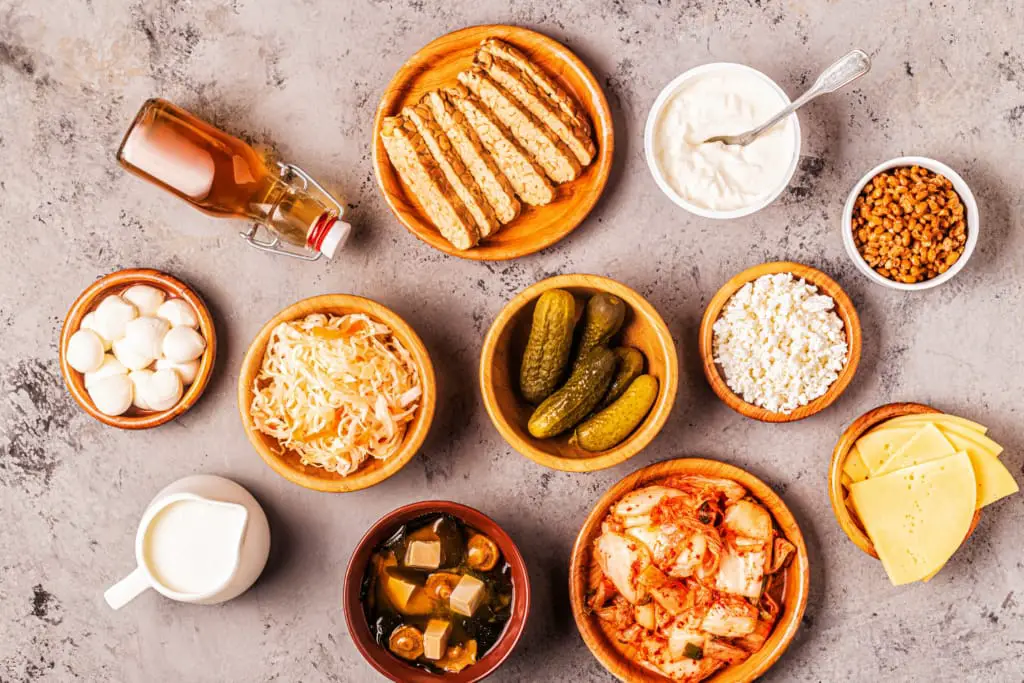
Probiotics are live bacteria and yeasts that provide numerous health benefits when consumed. They are often referred to as “friendly” or “good” bacteria because they help maintain the balance of microorganisms in our gut. Probiotics can be found in certain foods as well as in dietary supplements.
Including probiotic-rich foods in your diet can help promote a healthy gut and enhance overall well-being. Here are some foods that are rich in probiotics:
- Yogurt: Yogurt is one of the most well-known sources of probiotics. It contains live cultures of Lactobacillus bulgaricus and Streptococcus thermophilus, which can help improve digestion and boost the immune system. When choosing yogurt, look for brands that contain live and active cultures and avoid those with added sugars.
- Kefir: Kefir is a fermented drink made from milk that is similar to yogurt. It contains a variety of beneficial bacteria and yeasts, including Lactobacillus kefiri, which has been shown to have antimicrobial properties. Kefir is also a good source of protein, calcium, and other nutrients.
- Sauerkraut: Sauerkraut is a fermented cabbage dish that is high in probiotics. It contains Lactobacillus bacteria, which can help improve digestion and boost the immune system. Sauerkraut is also a good source of vitamin C and other nutrients.
- Kimchi: Kimchi is a Korean dish made from fermented vegetables, typically cabbage. It contains a variety of beneficial bacteria, including Lactobacillus plantarum and Lactobacillus brevis. Kimchi is also a good source of vitamins A and C and other nutrients.
- Miso: Miso is a Japanese seasoning made from fermented soybeans. It contains a variety of beneficial bacteria, including Lactobacillus and Bifidobacterium. Miso is also a good source of protein, vitamins, and minerals.
- Tempeh: Tempeh is a fermented soybean product that is often used as a meat substitute. It contains a variety of beneficial bacteria, including Rhizopus oligosporus, which can help improve digestion and boost the immune system. Tempeh is also a good source of protein, fiber, and other nutrients.
- Kombucha: Kombucha is a fermented tea drink that is becoming increasingly popular. It contains a variety of beneficial bacteria and yeasts, including Acetobacter and Saccharomyces. Kombucha is also a good source of antioxidants and other nutrients.
Prebiotic-Rich Foods: Feeding Your Gut’s Good Bacteria
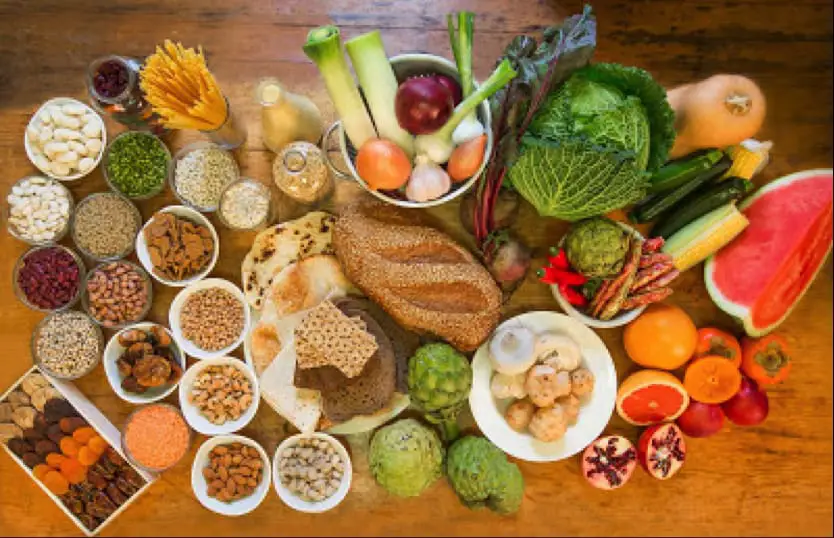
When it comes to promoting a healthy gut, it’s not just about consuming probiotics. Prebiotics also play a crucial role in nourishing the good bacteria in your gut. Prebiotics are a type of fiber that can’t be digested by our bodies but serve as food for beneficial bacteria. Including prebiotic-rich foods in your diet can help support a thriving gut microbiome. Here are some examples of prebiotic-rich foods:
- Chicory Root: Chicory root is a popular source of prebiotics. It contains a fiber called inulin, which serves as a fuel for the good bacteria in your gut. It can be consumed as a roasted and ground coffee substitute or added to foods as a powdered supplement.
- Garlic: Garlic not only adds flavor to dishes but also provides prebiotic benefits. It contains a compound called inulin-type fructans, which acts as a prebiotic and stimulates the growth of beneficial bacteria in the gut. Including raw or cooked garlic in your meals can help support a healthy gut.
- Onions: Onions contain a prebiotic fiber called fructooligosaccharides (FOS), which serves as food for beneficial bacteria. Raw or cooked onions can be added to a variety of dishes to enhance flavor while providing prebiotic benefits.
- Jerusalem Artichoke: Jerusalem artichoke, also known as sunchoke, is a root vegetable rich in inulin. It can be enjoyed roasted, sautéed, or added to soups and stews to provide prebiotic nourishment to your gut bacteria.
- Asparagus: Asparagus is not only a delicious vegetable but also a good source of prebiotic fiber. It contains a type of fiber called inulin, which helps feed the beneficial bacteria in your gut. Adding asparagus to your meals can contribute to a healthy gut microbiome.
- Bananas: Bananas are not only a convenient and tasty snack but also a good source of prebiotic fiber. They contain a type of fiber called resistant starch, which acts as a prebiotic and helps support the growth of beneficial bacteria in the gut.
- Oats: Oats are a nutritious whole grain that also provides prebiotic benefits. They contain a type of fiber called beta-glucan, which acts as a prebiotic and supports the growth of beneficial bacteria in the gut. Enjoying a bowl of oatmeal or adding oats to baked goods can help promote a healthy gut.
- Apples: “An apple a day keeps the doctor away” holds true when it comes to gut health. Apples contain a fiber called pectin, which acts as a prebiotic and supports the growth of beneficial bacteria in the gut. Enjoying fresh apples or adding them to salads or baked goods can provide prebiotic benefits.
Omega-3 Fatty Acids and Their Impact on Gut and Brain Health

Omega-3 fatty acids are essential nutrients that play a vital role in maintaining good health, particularly in the gut and brain. These healthy fats are not produced by our bodies, so it’s crucial to obtain them through our diet. Let’s explore the benefits of omega-3 fatty acids and how they positively impact our gut and brain health.
- Gut Health: Omega-3 fatty acids have anti-inflammatory properties that help promote a healthy gut. They can reduce inflammation in the gastrointestinal tract, which is essential for preventing digestive disorders such as inflammatory bowel disease (IBD). Including omega-3-rich foods in your diet, such as fatty fish (salmon, mackerel, sardines), chia seeds, and flaxseeds, can support a balanced gut microbiome and improve overall gut health.
- Brain Health: Omega-3 fatty acids are crucial for optimal brain function and development. They play a significant role in building brain cell membranes and promoting communication between brain cells. Studies have shown that omega-3 fatty acids, specifically docosahexaenoic acid (DHA), contribute to improved cognitive function and may reduce the risk of neurodegenerative diseases like Alzheimer’s. Consuming omega-3-rich foods or taking supplements can support brain health and enhance memory and learning abilities.
- Depression and Anxiety: The impact of omega-3 fatty acids on mental health cannot be understated. Research suggests that omega-3s may help reduce symptoms of depression and anxiety. These healthy fats can increase the production of neurotransmitters like serotonin, which are responsible for regulating mood. Including omega-3-rich foods in your diet may have a positive effect on mental well-being and help manage symptoms of depression and anxiety.
- Heart Health: Omega-3 fatty acids have long been recognized for their cardiovascular benefits. They can lower triglyceride levels, reduce blood pressure, and decrease the risk of heart disease. These heart-healthy fats can also help prevent the formation of blood clots and improve overall heart function. Consuming omega-3-rich foods like walnuts, flaxseeds, and fish can contribute to a healthy heart and reduce the risk of cardiovascular complications.
- Eye Health: DHA, a type of omega-3 fatty acid, is a crucial component of the retina in our eyes. Consuming omega-3s can help maintain good vision and reduce the risk of age-related macular degeneration (AMD), a leading cause of vision loss in older adults. Including omega-3-rich foods in your diet, such as fish and leafy green vegetables, can support optimal eye health and preserve vision.
- Inflammation and Immunity: Chronic inflammation is linked to various health conditions, including autoimmune diseases. Omega-3 fatty acids possess anti-inflammatory properties that can help reduce inflammation in the body and support a healthy immune response. By including omega-3-rich foods in your diet, you can potentially reduce the risk of chronic inflammatory conditions and enhance immune function.
omega-3 fatty acids are essential for maintaining good health, particularly in the gut and brain. They support a healthy gut microbiome, reduce inflammation, enhance brain function, and contribute to overall well-being. Including omega-3-rich foods in your diet, such as fatty fish, chia seeds, and flaxseeds, can provide you with the necessary nutrients to support gut and brain health. However, it’s essential to consult with a healthcare professional or registered dietitian for personalized advice and recommendations on incorporating omega-3 fatty acids into your diet.
Antioxidant-Rich Foods and Their Role in Gut and Mental Health
Antioxidants are powerful compounds found in certain foods that help protect our cells from damage caused by harmful molecules called free radicals. These free radicals can contribute to various health issues, including gut and mental health problems. Including antioxidant-rich foods in our diet can play a crucial role in promoting a healthy gut and maintaining optimal mental well-being. Let’s explore their benefits in more detail:
- Gut Health: Antioxidants have anti-inflammatory properties that can help reduce inflammation in the gut. Chronic inflammation in the gut can lead to digestive disorders such as inflammatory bowel disease (IBD) and irritable bowel syndrome (IBS). By consuming antioxidant-rich foods, such as berries, dark leafy greens, and nuts, we can support a healthy gut microbiome and improve overall gut health.
- Digestive Disorders: Antioxidants can help protect the gastrointestinal lining from damage caused by oxidative stress. Oxidative stress occurs when there is an imbalance between free radicals and antioxidants in the body. By including antioxidant-rich foods in our diet, we can help reduce oxidative stress and potentially alleviate symptoms of digestive disorders like acid reflux, gastritis, and ulcers.
- Mental Health: The connection between antioxidants and mental health is becoming increasingly recognized. Oxidative stress in the brain can contribute to the development of mental health disorders such as depression and anxiety. Antioxidants help combat oxidative stress and protect brain cells from damage. Consuming antioxidant-rich foods, such as colorful fruits and vegetables, can support optimal brain function and contribute to better mental well-being.
- Cognitive Decline: As we age, cognitive decline becomes a concern for many. Antioxidants, especially those found in berries and leafy greens, have been associated with improved cognitive function and a reduced risk of age-related cognitive decline and neurodegenerative diseases like Alzheimer’s. Including antioxidant-rich foods in our diet may help support brain health and preserve cognitive function.
- Immune Function: Antioxidants are known to support a healthy immune system. They help protect immune cells from oxidative damage, allowing them to function optimally. By consuming antioxidant-rich foods, we can strengthen our immune system and reduce the risk of infections and other immune-related disorders.
- Overall Well-being: Antioxidants play a vital role in overall well-being. They help reduce cellular damage, support healthy aging, and contribute to a strong and resilient body. By incorporating a variety of antioxidant-rich foods into our diet, we can promote good gut health, enhance mental well-being, and support overall vitality.
Fermented Foods: Tradition Meets Gut Health
Traditional fermented foods have long been cherished for their taste and their potential to promote a healthy gut. These foods undergo a natural fermentation process, where beneficial bacteria convert sugars into compounds like lactic acid. Including these foods in our diet can support a balanced gut microbiome and enhance digestive well-being. Let’s explore a list of traditional fermented foods that can help improve gut health:
- Yogurt: Yogurt is a classic fermented dairy product that contains live cultures of friendly bacteria, known as probiotics. These probiotics can help restore the natural balance of our gut microbiota, supporting digestion and overall gut health.
- Sauerkraut: Sauerkraut is a tangy, fermented cabbage dish that originates from Eastern Europe. Packed with probiotics, sauerkraut can aid digestion, improve nutrient absorption, and contribute to a healthy gut environment.
- Kimchi: Kimchi is a spicy fermented vegetable dish hailing from Korean cuisine. It is typically made with cabbage, radishes, and a blend of seasonings. Kimchi offers probiotics, vitamins, and antioxidants, which can benefit gut health and boost the immune system.
- Kombucha: Kombucha is a fizzy, fermented tea beverage created by fermenting sweetened tea with a symbiotic culture of bacteria and yeast (SCOBY). It is renowned for its probiotic content, which supports gut health and may provide antioxidant properties.
- Fermented Soy Products: Traditional fermented soy products like miso, tempeh, and natto are widely consumed in Asian countries. Miso is a paste made from fermented soybeans and has a savory flavor, while tempeh is a firm soybean cake with a nutty taste. Natto, a popular Japanese dish, is made from fermented soybeans and is known for its unique texture and flavor. These fermented soy products offer probiotics and can contribute to a healthy gut.
- Pickles: Pickles are cucumbers or other vegetables that have been preserved through the process of fermentation. Fermented pickles are rich in probiotics and can support digestion when consumed in moderation.
- Traditional Sourdough Bread: Sourdough bread is made using a traditional fermentation process involving wild yeast and lactobacillus bacteria. This natural fermentation makes the bread easier to digest and may have a positive impact on gut health compared to commercially processed bread.
- Fermented Dairy Drinks: Traditional fermented dairy drinks like kefir and lassi are known for their probiotic content. Kefir is a tangy beverage made by fermenting milk with kefir grains, while lassi is a refreshing yogurt-based drink often flavored with spices or fruits. These fermented dairy drinks can contribute to a healthy gut environment.
Nutrient-Dense Vegetables: Promoting Gut Health and Mental Clarity
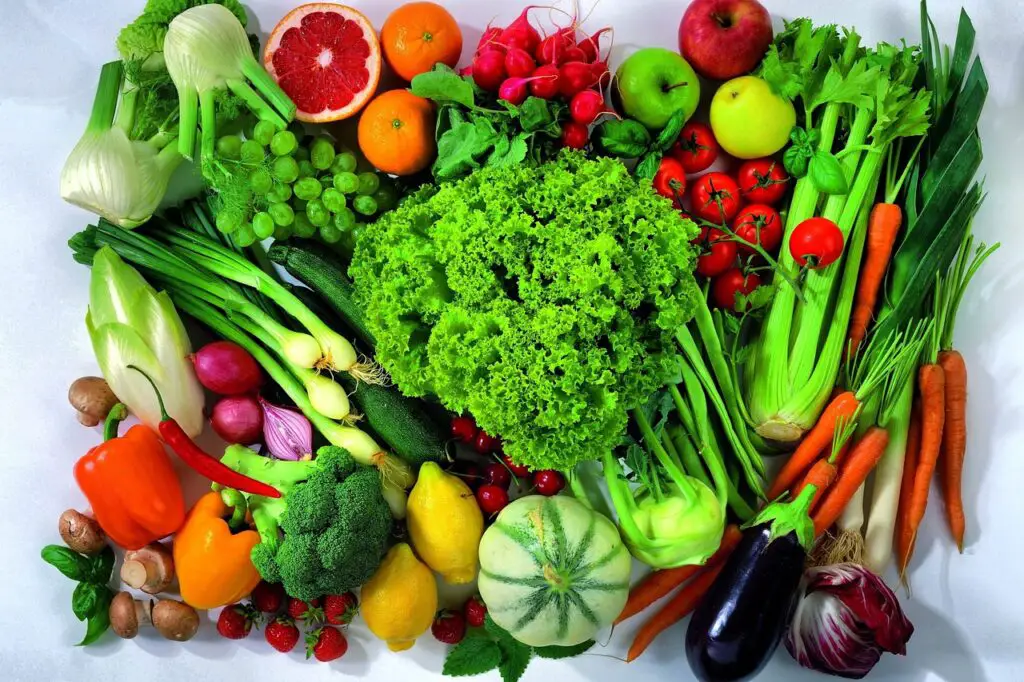
A diet rich in nutrient-dense vegetables can have a profound impact on our overall well-being, particularly when it comes to promoting gut health and mental clarity. These vegetables are packed with essential vitamins, minerals, fiber, and antioxidants that support our digestive system and cognitive function. Let’s explore a list of nutrient-dense vegetables that can contribute to improved gut health and mental clarity:
- Spinach: Spinach is a leafy green vegetable that is loaded with nutrients, including iron, folate, and vitamins A and C. It is also a great source of fiber, which promotes healthy digestion and supports the growth of beneficial gut bacteria.
- Kale: Kale is another nutrient powerhouse, packed with vitamins A, C, and K, as well as minerals like calcium and potassium. It contains antioxidants that help reduce inflammation in the body, including the gut, and can contribute to mental clarity.
- Broccoli: Broccoli is a cruciferous vegetable that is rich in fiber, vitamins C and K, and folate. It also contains compounds called glucosinolates, which have been associated with a healthy gut microbiome and improved cognitive function.
- Brussels Sprouts: Brussels sprouts are small, green cruciferous vegetables that provide an excellent source of fiber, vitamins C and K, and antioxidants. Their high fiber content supports regular bowel movements and can help maintain a healthy gut.
- Sweet Potatoes: Sweet potatoes are packed with nutrients, including vitamins A and C, potassium, and fiber. They have a lower glycemic index compared to regular potatoes, which means they release sugar more slowly, providing sustained energy for the brain and promoting mental clarity.
- Bell Peppers: Bell peppers, whether red, yellow, or green, are rich in vitamins A and C, as well as antioxidants. They are also a good source of fiber, which aids in digestion and supports a healthy gut environment.
- Carrots: Carrots are known for their high content of beta-carotene, which the body converts into vitamin A. They are also a good source of fiber and promote gut health by aiding in regular bowel movements.
- Cabbage: Cabbage is a cruciferous vegetable that is low in calories but high in nutrients, including vitamin C, fiber, and antioxidants. It supports gut health by providing beneficial bacteria with the necessary fuel to thrive.
- Cauliflower: Cauliflower is a versatile vegetable that is rich in fiber, vitamins C and K, and antioxidants. It contains compounds that can help reduce inflammation in the gut and support cognitive function.
Incorporating these nutrient-dense vegetables into our diet can provide a wide range of health benefits, including improved gut health and enhanced mental clarity. Aim to include a variety of these vegetables in your meals, whether raw, steamed, sautéed, or incorporated into soups or salads. As with any dietary changes, it’s important to listen to your body and consult with a healthcare professional or registered dietitian for personalized advice. Nourish your gut and support mental clarity by embracing the power of nutrient-dense vegetables.
Conclusion
In today’s fast-paced world, maintaining optimal health is more crucial than ever. Your gut health plays a pivotal role not just in digestion but also in your mental well-being. By incorporating certain foods into your diet, you can nourish your gut and support your overall mental clarity and mood.
FAQs about Gut Health and Food Choices
- What is the gut-brain connection, and why is it important?
- The gut-brain connection refers to the bidirectional communication between your gut and brain. A healthy gut promotes better mental health and cognitive function.
- Which foods are rich in probiotics?
- Foods like yogurt, kefir, and sauerkraut are excellent sources of probiotics, essential for maintaining a healthy balance of gut bacteria.
- What are prebiotics, and why are they important for gut health?
- Prebiotics are non-digestible fibers that feed the beneficial bacteria in your gut. They are found in foods like whole grains, chicory root, and garlic.
- How do omega-3 fatty acids benefit gut and brain health?
- Omega-3 fatty acids, found in fatty fish and flaxseeds, reduce inflammation in the gut and support brain function, enhancing mental well-being.
- Can fermented foods improve gut health?
- Yes, fermented foods like kimchi and tempeh contain probiotics that aid digestion and contribute to a healthy gut environment.
Reference : https://www.ncbi.nlm.nih.gov/pmc/articles/PMC3065426/
Read Similar Article : Mindful Eating Exercises for Kids In 2024: Fostering Healthy Habits

